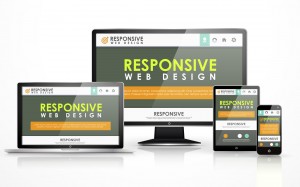If you’re not already familiar with the reasons for why you need a website, we’ll tell you the most important one: responsive design. A website provides your company with an online identity during an age in which Internet-leveraged marketing is a major key to success for any business. Still, just having a website is not enough. If your website provides visitors with a headache instead of a user-friendly experience, then a redesign could be what your business is missing.
Benefits of Responsive Design
Enhanced User Experience
One of the best ways to keep your business booming is to satisfy customers. Sadly, people are quickly turned off by poorly designed websites. A site that’s tough to navigate prompts a quick click on the “back” button and a visit to your competitors’ sites. However, a responsive website adjusts accordingly no matter which device it’s accessed from. This way, if someone visits your site from a smartphone, the content is just as viewable and navigable as it would be on a desktop.
Despite the fact that your site’s content will be streamlined across all platforms, responsive design boasts faster page-loading speeds than non-responsive sites. This is important because 40 percent of mobile users will abandon a web page if it takes more than three seconds to load.
Providing a great user experience will help keep visitors on your site and therefore make them more likely to make a purchase, or at least return to your site again. The fewer people who immediately leave your website after visiting it, the lower your bounce rate—an important SEO factor.
Google Loves Responsive Websites
A responsive website provides your business with more than just good looks. Google is pretty much the undisputed champion of the search engine world. They spell it out loud and clear: “Responsive design is Google’s recommended design pattern.” So, it makes sense to fulfill as much of their criteria for a great website as possible.
One of the reasons Google loves responsive websites so much is that there are more searches on mobile devices than there are on desktops. Search engines update their algorithms often, but they don’t announce all of those changes to make the lives of the majority of SEO professionals more difficult. Most of the updates have the goal of making search engines more user-friendly. With the majority of searches coming from mobile devices, search engines want your website to be mobile-friendly in order to bring searchers to the best performing sites available.
Easy to Manage
Without responsive design, you could have two separate sites—one for desktop and one for mobile. Two different websites call for twice as much time and effort. You would need two content strategies, two SEO campaigns and two design teams to make sure both websites were functioning properly.
Cost Effective
Of course, it’s not free to have your responsive site built by a professional web design agency, but, it’s worth it in the long run. Since one website has fewer marketing and analytics needs than two websites, the overhead cost of operating a responsive website is an awful lot lower than it is to run two separate sites.



